Page up and page down of crossed out names, sentences and sometimes whole pages in the extensive police investigation.
Closed doors during almost the entire trial in the Stockholm District Court.
And finally: A judgment where the public can only read parts of the court's reasoning.
- The material is absolutely the most secret material available, prosecutor Mats Ljungqvist has previously told SVT Nyheter.
That judgments are masked is relatively common.
It could, for example, be about sexual crimes against children, where there is reason to protect the children's privacy in various ways.
In this case, it concerns sensitive data from, among others, Säpo and the Swedish Armed Forces.
"Can't mesh on feeling"
The prosecutor in the case may have opinions about what should be kept secret, but it is ultimately the district court that decides what should actually be withheld from the public.
- You must not sit in a court and mask your feelings, there must be support in the law for that, says Nils Funcke, who, among other things, taught freedom of expression issues at Stockholm University and was secretary of the Freedom of Expression Committee.
- In a case like this, it could be things that are vital for Sweden's security that have come to light during the negotiations, he emphasizes.
Can appeal
But the secrecy also makes it difficult for anyone other than those directly involved to assess the prosecution's evidence.
- The more something is masked, the more possible conspiracy theories and incorrect interpretations there is a risk of becoming.
A court must try to keep this masking down and not just accept what the prosecutors and the police want to keep secret.
If, for example, the men's defenders are dissatisfied with how much has been shown to the public, they can appeal the confidentiality of information to the Court of Appeal.
SVT Nyheter has been in contact with the president of the court, who does not want to comment on the assessments before the verdict is published.

